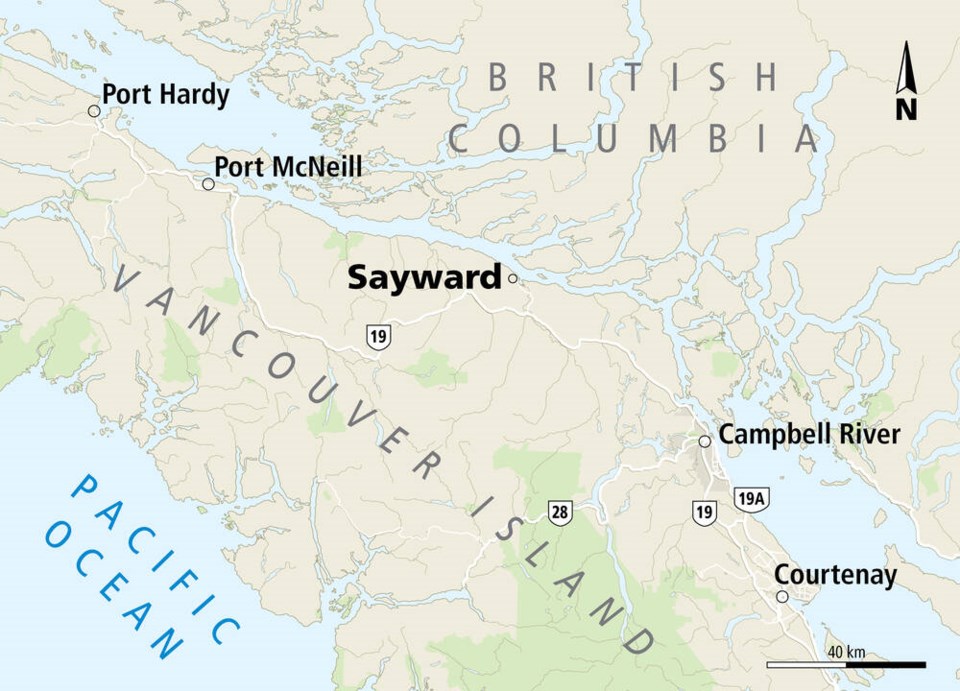The Village of Sayward is calling on the province to send in advisors to help settle ongoing differences around the council table, as it mulls its future as a municipality.
Council voted unanimously Tuesday in favour of a motion from Mayor Mark Baker to turn to Ministry of Municipal Affairs advisors and support.
The motion came out of discussions with the ministry, said Baker, noting there is a divide on five-member council. “I’m positive that it is going to be beneficial to us,” he said. “We need some help.”
A ministry spokesperson said in a statement Wednesday that Sayward has not formally reached out, but “the ministry is here to help local governments should they need advice or support about any matters that may be affecting a council’s ability to move forward. Our door is always open.”
In extraordinary circumstances, the ministry can appoint a temporary advisor to help council work with staff to improve communications, clarify roles and facilitate effective decision-making, the spokesperson said.
Advisors are independent contractors who will work with a council and then make a final report with recommendations to help with future decision-making.
Sayward is the latest small municipality in B.C. struggling with ongoing internal divisions. Tahsis council is facing a byelection this spring after two of its five council members resigned, one due to differences with fellow council members. Harrison Hot Springs and Lions Bay called for help from the province last year.
With a population estimated at 350, Sayward is between Campbell River and Port McNeill on the eastern side of Vancouver Island. The forestry-based community is in a picturesque location at the head of Kelsey Bay with a federal and small craft harbour.
Friction among council members and between council and the public is ongoing in the tiny community, which has become used to turnover among its mayors and chief administrative officers. Each role has changed hands several times in the past several years.
Baker said municipal finances and covering costs in a community with a small tax base are among local issues being contested.
Meetings have seen council members and the public yelling at each other, said Coun. Scott Burchett, who wants the ministry to investigate the administrative functioning and performance of the village.
The conflict has boiled over on social media.
Burchett said he is frustrated by his inability to obtain information about budget overruns, adding he has submitted a formal freedom of information request.
He said he is not given access to resources needed to do his job. “That’s a huge red flag.”
The municipal hall has also been closed for two months due to staffing issues that he cannot discuss, Burchett said.
Alex Turner, who lives in an adjacent valley, has suggested that Sayward hold an informational workshop to investigate the idea of dissolving the municipality and joining the Strathcona Regional District. That would mean the community would no longer have a mayor and council, and would instead by represented by an area director.
Turner said he’s seeing democratic processes “deteriorating right across the whole Western world.” At the local level, councils are having real difficulties functioning and getting along, he said, adding Sayward’s council “is not able to function as a team.”
Baker said the subject will be discussed at an upcoming committee of the whole meeting, but he opposes dissolving the municipality, saying the village boundaries would still be in place and residents would be responsible for paying the costs of infrastructure such as water and sewer.
Also, being a small municipality means Sayward receives federal and provincial grants to offset many local costs.
The idea of dissolving the municipality previously came up about four or five years ago, Baker said.
Under the Local Government Act, changes to a local governance structure, such as incorporation or disincorporation, require community input, according to the Ministry of Municipal Affairs.
The province can only revoke the letters patent of a municipality where a majority of electors have requested its dissolution in writing, a spokesperson said.
Existing municipal dissolution legislation pre-dates the creation of regional districts and does not contemplate the transfer of service or governance arrangements to a regional district, he said.


